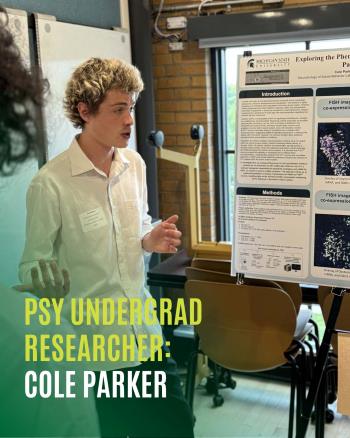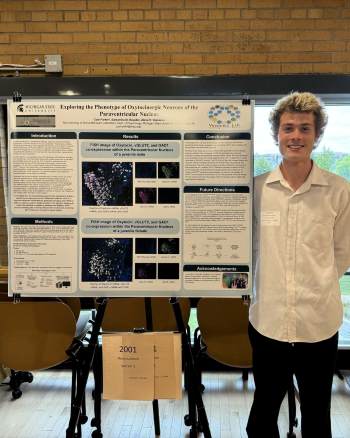PSY Student Research Spotlight: Cole Parker
July 31, 2024 - Shelly DeJong
 Cole Parker, a senior psychology major, is an undergraduate researcher in the Veenema Lab where they focus on social play behavior. This summer, Cole received a PURI Award from the College of Social Science to help support his research with Dr. Alexa Veenema.
Cole Parker, a senior psychology major, is an undergraduate researcher in the Veenema Lab where they focus on social play behavior. This summer, Cole received a PURI Award from the College of Social Science to help support his research with Dr. Alexa Veenema.
Read on to learn about Cole's research, what has surprised him about working in a behavioral neuroscience lab, and what his hopes are for the future.
Why psychology?
I got really interested in human behavior and I like that psychology ties into that really well. After taking some psychology classes, I learned more about the subfield of behavioral neuroscience and have really enjoyed that. I like the biology behind it and how in-depth it is. I really like the mesh between neuroscience and psychology.
Congratulations on your PURI Award! Can you talk about your project?
In the Veenema Lab, we study social play, which is essentially evident in all mammalian species, and it is an essential behavior for social competence later in life. The primary neurotransmitter we study is oxytocin which has been implicated to regulate specific behavior.
This summer, I am looking at neurons that produce oxytocin located in paraventricular nucleus, and I'm determining whether they also co-synthesize or co-release either the primary excitatory neurotransmitter, glutamate, or the primary inhibitory neurotransmitter GABA.
We're interested in how other signaling mechanisms may work along with oxytocin. Oxytocin is a neuropeptide, so it's kind of slower to move across the synapse and has longer effects. GABA and glutamate have extremely fast effects and are shorter lived. We’re curious whether there might be an alternative or a co-release signaling mechanism that could produce stronger effects with an excitatory neurotransmitter or a primary inhibitory neurotransmitter.
 What has surprised you about working in the Veenema Lab?
What has surprised you about working in the Veenema Lab?
My prior research experiences were more hands off, so I’ve appreciated how hands on this experience has been. I'm essentially getting trained on extremely technical and sophisticated techniques before even taking a neuroscience course! It was definitely an adjustment for the first two or three months when I got into the lab—especially as I learned procedures in how to do things correctly. We’re working with extremely expensive chemicals and bio fluids so it's important to follow procedures exactly. But it is really cool to be getting this type of hands on experience as an undergrad.
Do you know what you're thinking for the future?
I want to apply to clinical psych PhD programs, and ultimately be a forensic neuropsychologist.
Would you like to give a shoutout to anyone who has helped you in your journey as a student?
My graduate mentor Samantha Bowden has been the best. I cannot think of a better mentor. She has been very patient with me and has supported me throughout the whole process. As my PI, Alexa Veenema has also been important in my journey. I would also like to thank Marty Spranger in the Department of Physiology for spurring on my interest in neuroscience. He’s just a great teacher and a really cool guy.

